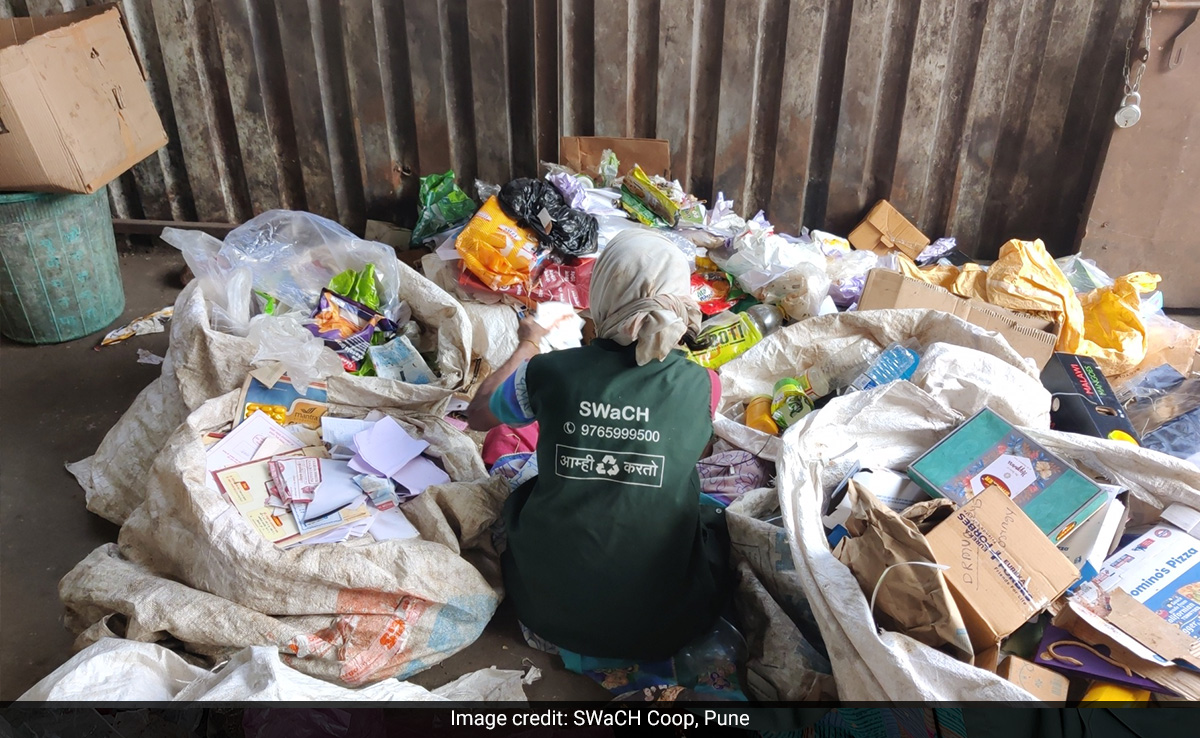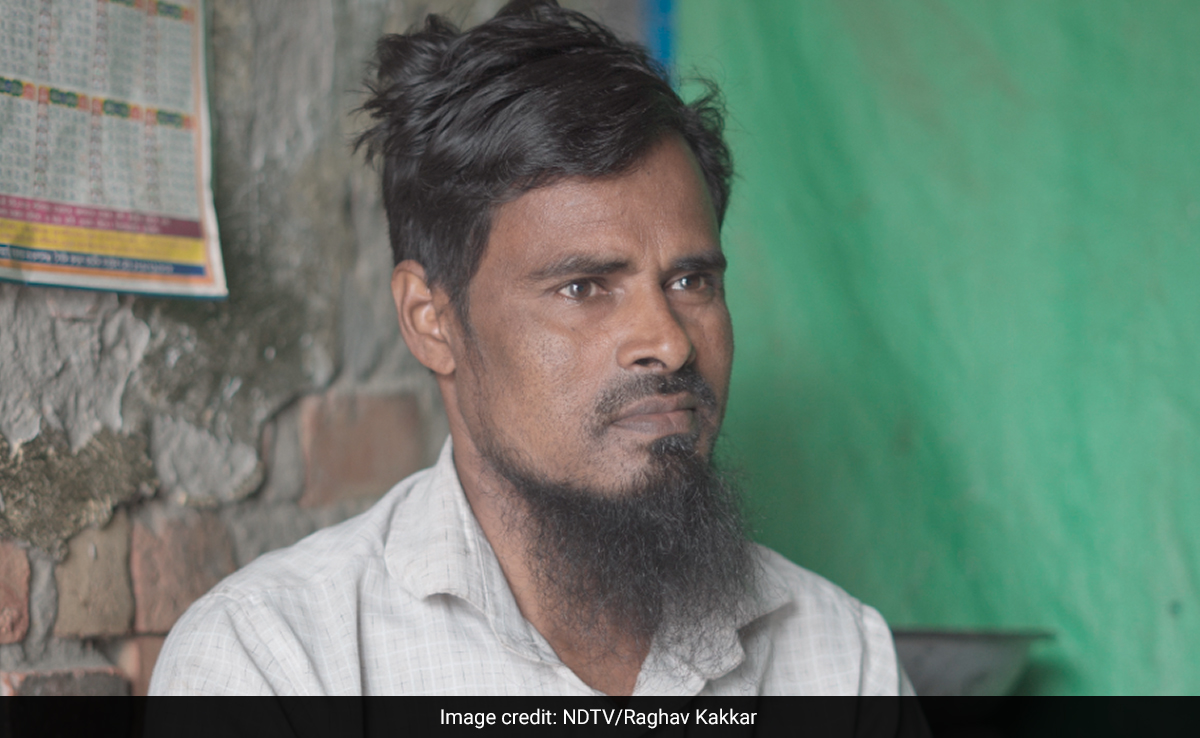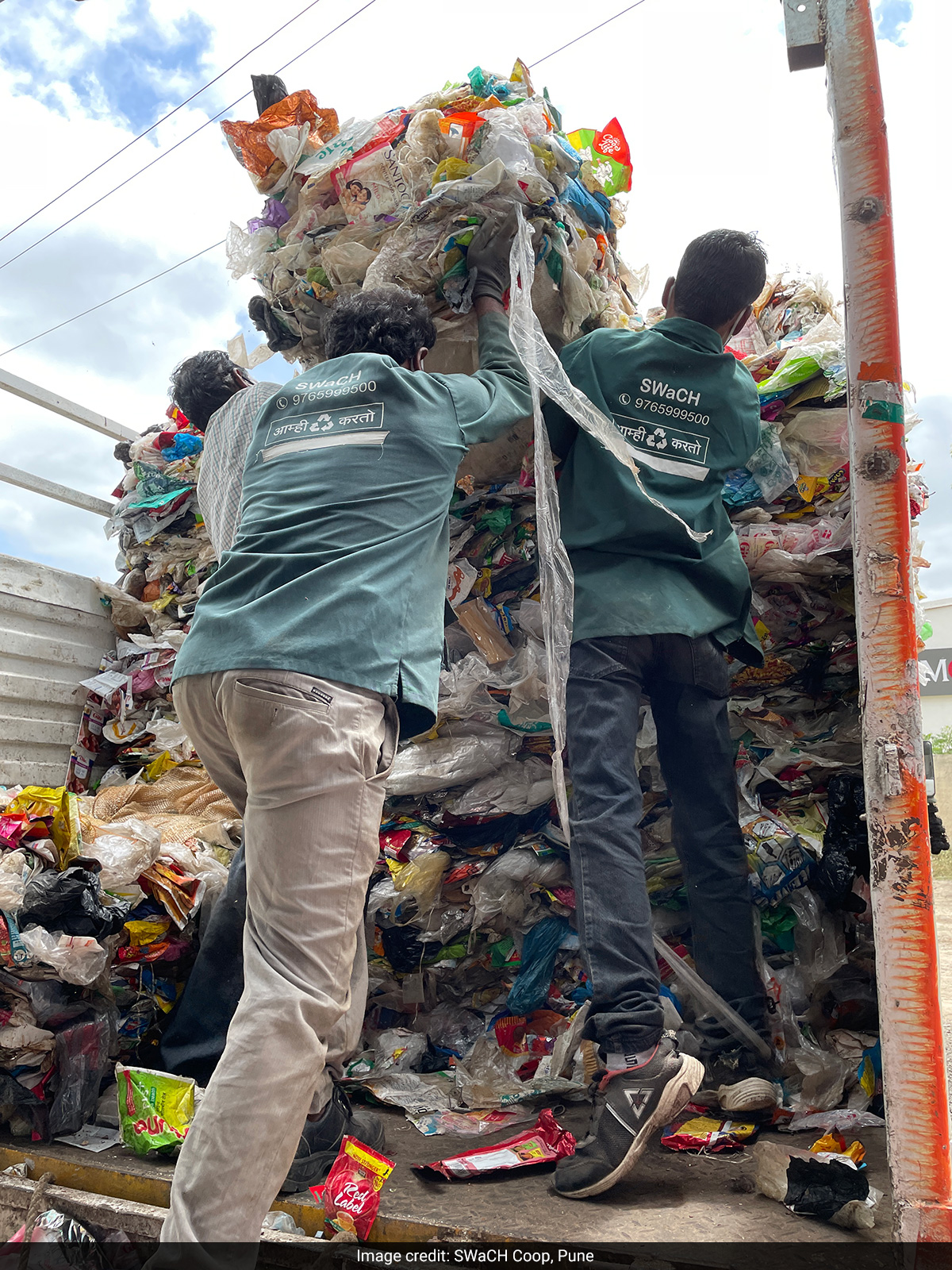New Delhi: Vidya Naiknaware from Dhankawadi in Pune city leaves her house at 7:15 am every day for work. A brisk walk leads her to an assembly point to mark attendance. After a quick 15-minute roll call and general catching up, 35-year-old Ms. Naiknaware and her colleagues disperse for door-to-door collection of Municipal Solid Waste (MSW).
In parts of Pune, each household hands out waste segregated into three primary categories – wet, dry and sanitary waste, which includes pads, diapers and condoms. Along with this, thermocol waste is handled separately as that is voluminous in nature.
By 10:30-11 am, Ms. Naiknaware completes collecting garbage from around 300 houses in her vicinity. And then begins the process of segregating and sorting collected waste; she ends her work shift by 2:30-3 pm.
Dry waste is divided into categories like plastic bottles, containers, food boxes, plastic bags, and multilayered plastic, among others. Ms. Naiknaware recovers valuable waste and sells it to recyclers for livelihood. The non-recyclable dry waste, or things like shampoo sachets which can’t be sold by her, are dropped off at Pune Municipal Corporation (PMC) ‘feeder points’.
Similarly, Ms. Naiknaware helps housing societies in composting their wet waste, given they have a composting facility. The remaining wet waste is again given to PMC, along with the sanitary waste.
Also Read: Fighting India’s Garbage Crisis: All About Composting
Ms. Naiknaware is a part of SWaCH (Solid Waste Collection and Handling), India’s largest cooperative, completely owned by waste workers. But, much before becoming a part of SWaCH, waste pickers and itinerant waste pickers/collectors in Pune and Pimpri Chinchwad were a part of Kagad Kach Patra Kashtakari Panchayat (KKPKP), a membership-based trade union in 1993.
Ms. Naiknaware, a waste picker, is now recognised and appreciated by PMC for the same work she used to do informally until 2005.
I used to walk around Dhankawadi and look through public dustbins to find recyclable plastic. I would jump into the waste containers to get waste that could bring me money. But it wasn’t safe; there were sharp objects lying around, dogs would also sit over the waste and bark and the police would stop us from fidgeting with garbage, recalled Ms. Naiknaware.
Depending on the time spent outdoors and quantity of the waste collected, Ms. Naiknaware would manage to earn Rs. 100 to Rs. 200 a day.
Now that Ms. Naiknaware works closely with PMC, she has a stable income in the form of user-fee she gets from individual households and shops for providing her service. Additionally, she earns from selling recyclable waste. Collectively, she makes around Rs. 20,000 a month.
“Kagad means paper, Kach means glass and Patra means metal. So these were the three recyclables that waste workers, mostly women, used to collect,” said Amogh Bhongale, Outreach and Communication Lead, SWaCH Coop Pune as he shared the story of KKPKP.
Back in the 90s, Lakshmi Narayan and Poornima were running an adult education program in slum areas of Pune and Pimpri Chinchwad. When they interacted with the women from the slums, they found out that there is a huge community of waste pickers who were actually climate migrants from different drought-hit regions of Maharashtra. These people had no land, no identity and nothing in their name; they had come to cities to figure out their livelihood.
“When Lakshmi and Poornima learned about waste pickers’ lifestyle and how they have to walk miles to get two square meals, they realised the role they wanted to play in society. They reduce the waste burden on the landfill, but are extremely under-recognised. And that’s how they decided to bring all of them together and founded KKPKP, a trade union of informal waste pickers,” said Mr. Bhongale.
KKPKP pushed for better working conditions for the waste pickers and for the protection of their rights through representations to the government. The trade union also helped waste pickers in getting identity cards.
Later in 2000, when the Centre released Municipal Solid Wastes (Management & Handling) Rules, 2000 (MSW Rules), all municipalities were made responsible for the collection, segregation, storage, transportation, processing and disposal of municipal solid waste.
“There was also a push towards reducing containers on the street and making the city ‘container-free’. So, Pune Municipal Corporation ran a campaign called ‘Remove The Containers’ from the city and that kind of threatened waste pickers’ livelihoods. In 2005, KKPKP initiated a dialogue with PMC to include waste pickers in the system,” explained Mr. Bhongale.
KKPKP in collaboration with the Department of Adult Education, SNDT Women’s University implemented a pilot program to upskill 1,500 waste pickers as service providers for door-to-door waste collection from over one lakh houses in the city.
The pilot ran on the condition that each house will pay a user fee to waste pickers instead of PMC giving out salaries. A user fee of Rs. 70 is charged from each household, Rs. 50 from slum households and Rs. 150 from shops. The pilot was successful as it addressed two key issues – the waste pickers’ interest in upgrading their livelihood and the municipality’s interest in sustainable municipal solid waste management.
Also Read: A Road To Garbage-Free City: How Can Cities Manage Their Waste In A Sustainable Manner
Pune Municipal Corporation Saves Crores, Courtesy Waste Workers
In 2007, SWaCH, a cooperative was formed by KKPKP and PMC together through a general body resolution of PMC. The cooperative is completely owned by its waste picker members. An agreement between PMC and SWaCH was formulated to decentralise waste management in Pune.
Today, around 3,700 waste pickers are a part of SWaCH, covering over 9.5 lakh properties. 70 per cent of waste pickers are women who have attained financial independence. One such woman is 40-year-old Rani Shivsharan from Hadapsar town in Pune city who now earns Rs. 20,000 to Rs. 25,000 per month contrary to Rs. 10,000 to Rs. 15,000 she would make before joining SWaCH.
Talking about her informal job, Ms. Shivsharan said she had to walk a lot. The longer the walk and hunt, more the money she would earn.
Jaana kitni door hai ye pata nahi hota tha, bas paisa aana chahiye. Jab peeche mud ke dekhte tab pata chalta tha kitni door aa gaye. (We wouldn’t know how far we would have to go; we would walk for money. It’s only when you look back, you realise how far you have come). But today, I have designated houses – they know me and I know them. I don’t have to walk around aimlessly in search of waste.
This decentralised system of waste management costs PMC Rs. 7.7 crore per annum – including Rs. 4.3 crore of administrative costs, Rs. 1 crore for equipment like pull carts, and Rs. 2.4 crore is spent on user-fee subsidies given to slum dwellers. As per the impact report prepared by SWaCH, PMC saves Rs. 21 crore because of waste workers who sort and send waste for recycling instead of sending it to landfill and Rs. 92 crore in manpower costs.
The dry waste collected from each house is further segregated into 20-30 categories. There is a ‘feeder point’ where around 10 waste pickers gather to sort the collected waste and hand it over to the PMC waste pickup van.

A waste worker segregating dry waste into multiple categories like plastic bottles, paper, cardboard boxes
“Let’s say one waste picker covers 250 houses. 10 will cover 2,500 houses. This way, PMC vehicle collects the waste of 2,500 households from one location,” said Mr. Bhongale.
In the absence of waste workers, PMC vehicles would have to make trips and rounds to all the housing societies leading to more manpower requirement – one person to drive the vehicle and two or three to collect and dump the waste in the van. This would require additional fuel consumption.
When recyclables are diverted, it reduces the burden on the city’s waste management system; again saving on transportation and processing of waste.
According to the information shared by Mr. Bhongale, SWaCH waste pickers divert 200 metric tonnes of dry waste from landfills every day and send it for recycling.
Also Read: Solid Waste Management In India: The Challenge Of Growing Mountains Of Garbage – Landfills
“Being at the beginning of the chain, their door-to-door collection and sorting of dry recyclables ensure high-quality segregated inputs for PMC’s processing plants hence diverting maximum waste from landfills,” said Dr. Ketaki Ghatge, Medical Officer in the SWM Department, PMC.
Only rejects from processing plants end up in a landfill. Without the presence of SWaCH waste pickers, a large amount of mixed waste would be rejected by plants and therefore end up in landfills.
Mr. Bhongale also informed that under Extended Producer’s Responsibility (EPR), 100kg of thermocol waste and 3 tonnes of multi-layer plastic is collected and sent for recycling daily. Waste pickers also collect 3 tonnes per day (TPD) of sanitary waste, 6.5 TPD of waste that is composted and used to generate biogas and 1 TPD of reusable waste like bags.
Also Read: ‘Segregate Menstrual Waste, Mark It With A Red Dot’, Urge Pune Based SWaCH’s Sanitation Workers
SWaCH, A Lesson For Delhi
Pune’s waste model has been lauded by experts and recommended for cities like Delhi struggling with its humongous amount of waste.
The Solid Waste Management (SWM) Rules, 2016 mandate source segregation and inclusion of waste pickers but Delhi hasn’t been able to do so. In the national capital, there are people like Ms. Naiknaware and Ms. Shivsharan, involved in door-to-door waste collection, but they aren’t paid directly. They have to make a living by selling recyclables.
Ansar Ali was 12 years old when he moved to Delhi from the rural belt of West Bengal with his aunt. “We didn’t have food to eat. We were in shambles,” says Mr. Ali, now 48, with four children.
Mr. Ali started working at a plastic godown (warehouse) where he learned about door-to-door waste collection and a year later, he made the switch. Mr. Ali starts work at 7 am, collecting waste from 300 houses.
Paise hume nahi milte (We don’t get user fee). I am not hired directly by any house or residential society to pick waste. I work on someone’s behalf. As part of the deal, I get to keep the recyclables or valuable material like cardboard boxes, plastic bottles, bags, from the collected waste, and dump the remaining in the waste pick-up van or container, he said.
Mr. Ali lives in a small makeshift house, with a handful of bricks used to construct the four walls and layers of tarpaulin and tin to create a roof. There is little to no difference between the hallway leading to the bedroom and the kitchen. The jhuggi (house) is nestled between heaps of dry waste.
After I bring waste, my wife and I sit to segregate. Like plastic bottles in one bag, metal in another and food containers in another. Plastic sheets which are used to wrap air conditioners or other electric appliances are also collected and washed before selling for recycling, explains Mr. Ali.
The stigma attached to Mr. Ali’s job often acts as a hurdle.
Whenever an incident of robbery is reported in a nearby locality, we are harassed and questioned by the police.
People like Mr. Ali can be valuable stakeholders in addressing the waste crisis. They reduce the amount of waste to be dumped at landfills by sorting them at the primary level.
Also Read: Garbage-Free Cities: What Have These Cities Done Right About Waste Management?
“Delhi relies on a largely informal sector of over 1.5 lakh waste workers to collect, segregate and recycle 20-25 per cent of its waste. Yet they remain unacknowledged and unrewarded,” said Chitra Mukherjee, Consultant, Waste and Sustainable Livelihood.
We need them to keep our cities clean. They provide an essential service of door-to-door waste collection and segregation. This helps prevent the creation of more landfills as recyclable dry waste is segregated out of the waste stream and recycled.

SWaCH, a cooperative of waste pickers, works closely with the Pune Municipal Corporation in managing city’s waste
The major focus of the Swachh Bharat Mission (Urban) 2.0 [SBM (U) 2.0] launched on October 1, 2021, is to make cities garbage-free. SBM-U 2.0 focuses on solid waste management through segregation at the source and management of garbage through scientific processes, like dumpsite remediation that is the removal of waste that has accumulated on dumpsites over the years.
“We need to look at including and integrating the informal waste recycling sector of waste pickers, kabbadiwalas and scrap dealers who work, collect, and process waste, making India one of the countries with the highest recycling rates in the world,” said Ms. Mukherjee.
But, source segregation has to be at the heart of waste management. Pune has been practising segregation since 2008. The inclusion of waste pickers helped in the proper segregation and reduction of waste going to landfills.
“Waste workers hail from mostly economically and socially marginalised sections of society, are mostly illiterate but resilient and experts in sorting, and therefore, ensure the highest level of recycling through their labour and linkages with the informal recycling network,” said Dr. Ghatge.
Dr. Ghatge’s 5 key waste management lessons for Delhi:
- Create a method for just transition of informal waste workers through integration into formal solid waste management activities of the city
- Providing direct doorstep waste collection service at minimal costs through user fee payments
- Cities can attain the highest level of segregation and decentralisation through the capacity building of waste workers. Train waste pickers to practice secondary waste segregation and to be able to provide composting services at the source
- Decentralised waste management through the provision of working spaces/sorting sheds for waste pickers, through ward level composting and bio-methanation plants
- Extended Producer Responsibility is a policy approach in which producers are responsible for the management of post-consumer products. Cities should promote just EPR through the inclusion of informal recycling sector in the management of low-value materials like waste pickers in Pune collect thermocol waste or multi-layered plastic
This report was written and produced as part of a media skills development program delivered by Thomson Reuters Foundation. The content is the sole responsibility of the author and the publisher.
NDTV – Dettol have been working towards a clean and healthy India since 2014 via the Banega Swachh India initiative, which is helmed by Campaign Ambassador Amitabh Bachchan. The campaign aims to highlight the inter-dependency of humans and the environment, and of humans on one another with the focus on One Health, One Planet, One Future – Leaving No One Behind. It stresses on the need to take care of, and consider, everyone’s health in India – especially vulnerable communities – the LGBTQ population, indigenous people, India’s different tribes, ethnic and linguistic minorities, people with disabilities, migrants, geographically remote populations, gender and sexual minorities. In wake of the current COVID-19 pandemic, the need for WASH (Water, Sanitation and Hygiene) is reaffirmed as handwashing is one of the ways to prevent Coronavirus infection and other diseases. The campaign will continue to raise awareness on the same along with focussing on the importance of nutrition and healthcare for women and children, fight malnutrition, mental wellbeing, self care, science and health, adolescent health & gender awareness. Along with the health of people, the campaign has realised the need to also take care of the health of the eco-system. Our environment is fragile due to human activity, which is not only over-exploiting available resources, but also generating immense pollution as a result of using and extracting those resources. The imbalance has also led to immense biodiversity loss that has caused one of the biggest threats to human survival – climate change. It has now been described as a “code red for humanity.” The campaign will continue to cover issues like air pollution, waste management, plastic ban, manual scavenging and sanitation workers and menstrual hygiene. Banega Swasth India will also be taking forward the dream of Swasth Bharat, the campaign feels that only a Swachh or clean India where toilets are used and open defecation free (ODF) status achieved as part of the Swachh Bharat Abhiyan launched by Prime Minister Narendra Modi in 2014, can eradicate diseases like diahorrea and the country can become a Swasth or healthy India.


































